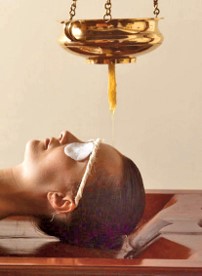Men's Health Part 1
"Health" is feminine - not only as a word, but also in our perception: we see many more female users of our health-promoting services and goods from Ayurvedic medicine.
Where are the men? What about self-responsibility on the subject of health among men?
Many men pass on the responsibility for health to their partner. The men who do take care of their health often do it through sport.
 If we stay with the play on words and say that "health" is female, then "Ayurveda" is male. In stereotypical images, Ayurveda is always depicted with female photo subjects. /p>
If we stay with the play on words and say that "health" is female, then "Ayurveda" is male. In stereotypical images, Ayurveda is always depicted with female photo subjects. /p>

Historically, the teaching and practice of Ayurvedic medicine has long been the domain of men. Only in recent decades, both in India and in Europe, have female students and doctors gained a majority in the former male domain.
Especially outside India, women are the pioneers in the practical application of Ayurveda. However, Ayurveda has much to offer men as well.
Ayurveda is universal
Ayurveda is the expression of universal natural laws that govern life. Whoever lives in harmony with these laws is and remains healthy. Whoever neglects them will build up more and more imbalance in the mind-body system, which expresses itself in illness, suffering and reduced life span.
Every human being is called upon to take responsibility for health himself. We very often observe that men - in contrast to women - take very little care of their health. Responsibility for health cannot be delegated. In the classical texts, this is regulated in such a way that the doctor makes a diagnosis and a treatment plan, which is to be implemented by the patient on his or her own responsibility.
Three areas of health care
This treatment plan provides for activities in three areas: Ahara (diet), Vihara (lifestyle) and Rasayana (preventive medication). Recommendations for these three areas should be discussed at each medical consultation and then implemented on one's own responsibility. Each person reacts differently to stresses, but also to therapeutic stimuli, due to their composition of doshas (vata, pitta and kapha) and dhatus (body tissues).
Body intelligence
The body is an expression of nature and has an unimaginably high intelligence that expresses itself in the most diverse regulatory circuits. In the case of incorrect stress, the body immediately gives signals that something is not right. These signals express themselves as discomfort and can easily be overlooked or ignored at first. Constant disregard of the body's signals inevitably leads to serious illness over time.
When it comes to these signals, many men seem to be less sensitive than women. According to Ayurveda, men are on average "hotter" than women and also more outward-looking. These qualities favour behavioural patterns that neglect the delicate impulses of the body. This often leads to men seeking medical advice and help only at a later stage of development of an illness.
Ayurveda and prevention
Both Ayurveda and modern medicine can do a great deal to treat diseases that have developed. However, the deep concern of Maharishi AyurVeda is to prevent diseases from developing in the first place. This is possible if preventive measures in the areas of Ahara (diet), Vihara (lifestyle) and Rasayana (preventive medication) are carried out regularly.
Our concern is to get men also to adopt these highly effective preventive measures. A life brimming with health, joie de vivre and vitality into old age is the reward for implementing Ayurvedic preventive measures.
Ahara (diet)
 Many men nowadays go without a hot lunch. One of the most important Ayurvedic dietary recommendations is to have the main meal at noon. Doing so keeps one in tune with the rhythm of the digestive fire Agni.
Many men nowadays go without a hot lunch. One of the most important Ayurvedic dietary recommendations is to have the main meal at noon. Doing so keeps one in tune with the rhythm of the digestive fire Agni.
A satisfying lunch also leads to eating less in the evening. This improves sleep and regeneration at night.
Another phenomenon in men is often eating too quickly. Digestion begins in the mouth. That is why good chewing and slow eating leads to better processing of a meal and less tiredness after eating.
Many digestive disorders (gastritis, flatulence, irregular bowel movements) can be prevented by proper seasoning. Generally, men tend to use too much salt and too many hot spices. Depending on the leading dosha, it is important to use the appropriate flavours to support the digestive system. Our churnas (Vata, Pitta, Kapha) are very suitable for this purpose.
Luxury food

The consumption of alcohol and coffee is disproportionately high among men. Alcohol is portrayed in classical Ayurvedic texts as a stimulant that can contribute to cheerfulness and festive mood when used occasionally. However, alcohol should by no means be consumed on a daily basis because it severely disrupts the formation of ojas, the body's fluid for vitality and immunity.
The consumption of coffee is viewed similarly in Ayurveda: its stimulating effect on the mind and body creates hours of increased alertness and performance when used occasionally. Daily consumption can create too much restlessness in the mind-body system, preventing effective regeneration and accelerating the ageing process. So here too, occasional coffee consumption can contribute to the joy of life, if Vata is not strongly dominant and nervousness and sleep disturbances result.
Summary
In Europe, Ayurveda is obviously being adopted faster and earlier by women than by men. Nevertheless, Ayurveda offers a large number of practical health tips that can specifically improve male health and vitality. These recommendations concern the areas of Ahara (diet), Vihara (lifestyle) and Rasayana (preventive medication).
The most important dietary recommendations include a warm main meal at noon and good chewing, as well as abstaining from daily consumption of stimulants such as alcohol and coffee.


We look forward to your feedback!